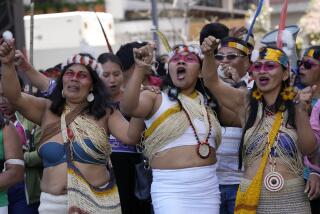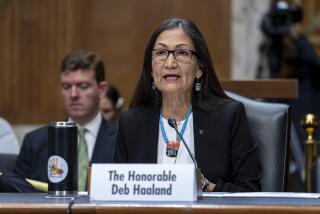Occidental to shed oil holdings in Peru
- Share via
Occidental Petroleum Corp. said Wednesday that it was pulling out of Peru, where its search for oil and natural gas in remote jungles ran into opposition from some who live there.
Westwood-based Occidental, which has been in Peru since the early 1970s, said it would sell its holdings there to focus on its operations in the Middle East and North America. The company no longer produces petroleum in Peru but still owns drilling rights to three blocks of land totaling 6.3 million acres.
“This is basically a business decision,” Occidental spokesman Larry Meriage said. “We move in and out of places all the time.”
Indigenous leaders and activists visiting Los Angeles claimed victory and demanded further environmental cleanup by Occidental, which sold its Peruvian drilling operation seven years ago to Argentine oil company Pluspetrol.
“By announcing their decision to withdraw entirely from Peru, Occidental is setting a precedent for the oil industry,” said Atossa Soltani, executive director of Amazon Watch, a San Francisco-based nonprofit. “The marginal benefits of operating are being overshadowed by the damages these companies end up doing to indigenous communities and to their own reputation.”
Although Occidental attributed its move to business factors, some analysts said the decision was prompted in part by the changing political nature of oil contracts in South America as more governments demanded a greater share in oil revenues.
The pullout could indicate that the company wants to avoid the “aggravation” of operating in the region, said John Parry, a senior analyst with John S. Herold Inc.
“Why continue to fight against a trend of nationalization that’s just going to cause them a lot of headaches?” he said. “This may just be the tip of the iceberg” of companies pulling out of the region.
In May, the government of Ecuador seized Occidental’s oil projects there in a move that the company is still contesting. Venezuela has increasingly taken larger stakes in projects run by foreign oil companies, and Bolivia nationalized its oil and gas industries in May, although it later suspended that move.
Occidental still has oil-producing operations in Columbia and Argentina.
Pavel Molchanov of Raymond James & Associates saw Occidental’s decision to leave Peru as primarily economic.
“If the asset is sufficiently small, it could make sense to get rid of it, avoiding any political risk,” he said.
Leaders of the Achuar Indian community say they will continue to lobby Occidental to help clean up the pollution that activists say is the legacy of 30 years of operations in the country. But Meriage said that Pluspetrol, as part of its 1999 purchase, assumed full responsibility for the land and its operations, and that activists were looking to an American company with “deep pockets” to blame.
Community leaders disagree.
“We are here with a mandate from our community that Oxy take responsibility for what they have left behind,” said Gonzalo Payma Carijano, vice president of the Federation of Native Communities of the Corrientes River. The rivers and lagoons near his village are so contaminated that villagers and wildlife can’t eat the fish from them, he said.
Carijano is one of three indigenous Achuar leaders touring the country with Amazon Watch, lobbying oil companies to stay out of the Amazon rain forest.
Pluspetrol in October agreed to demands such as healthcare, oil royalties and environmental cleanup after hundreds of activists shut down production to protest pollution. Twelve activists face criminal charges related to the protest.
Health studies have found that area residents have high levels of toxins in their livers, probably related to oil contamination, said Lily La Torre, a community legal advisor.
More to Read
Sign up for Essential California
The most important California stories and recommendations in your inbox every morning.
You may occasionally receive promotional content from the Los Angeles Times.














